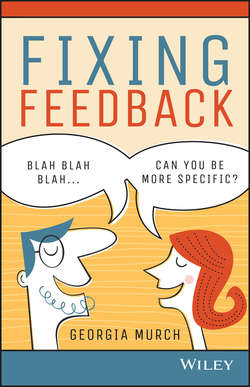Читать книгу Fixing Feedback - Murch Georgia - Страница 8
На сайте Литреса книга снята с продажи.
Chapter 1
Feedback is broken
The people noise is loud
ОглавлениеWe need to get the best from our people so our businesses can thrive. So we get it, right?! Right!
Then why is it that some of the biggest problems we have in organisations are our people? People, our greatest treasure, can also become our greatest liability. ‘People noise’ can become so loud sometimes that it makes it hard to implement anything. People noise is like white noise … it's always on in the background until we turn it off.
When I say ‘we’ I don't mean us or them. I mean you. The leader, the manager, the colleague. If you see there is something to be done then you need to do it. We often wait for someone else to take the lead, have that conversation, or set the tone. No wonder it doesn't happen. As Gandhi said, ‘Be the change that you wish to see in the world’.
MANAGERS NEED TO manage. MANAGING IS MORE ABOUT THE people issues THAN ANYTHING ELSE
Peter Drucker tells us that most of what we call ‘management’ consists of making it difficult for people to get their work done. Managers either create the people noise themselves or they don't turn it off when they need to. They don't lead.
The issues that demand most of our time are often the people ones. Do any of these scenarios sound familiar?
• You are trying to prepare your weekly report and John pops in to discuss an issue he has with the project leader's style and how it is affecting the team.
• You are delivering a strategy that will improve the productivity of the business but Tom does not want to work with Mary to deliver it. She's just too difficult.
• You are leading Sam's performance review and giving him feedback on his consistently late delivery. You go into a battle about who needs to take responsibility, as he says Jennifer keeps holding him back.
• You want to implement a new system that will provide a smoother approach when working with clients, but half of the team is divided because they will be more dependent on IT and they don't enjoy working with that area of the business.
People noise is our constant whether we recognise it or not. The success of a great strategy and its implementation hinges on how well people work together. Harnessing this power as not just a manager, but as a ‘doer’, and reducing the people noise makes the process of working together easier and, dare I say, more enjoyable.
The eighth consecutive study on engagement conducted by research company Gallup tells us that the cost of disengaged employees is deemed critical to a company's performance. The statistics are highly compelling. Some examples of a highly engaged workforce where people enjoy coming to work and working with each other suggest that there is:
• 65 per cent less turnover
• 37 per cent less absenteeism
• 48 per cent fewer safety incidents.
It is clear that minimising the people issues and creating a highly engaged workforce makes a difference. We're not talking about satisfaction for its own sake. We are talking about the cost implications of not investing in your people. More about this in chapter 2.
There are three options for dealing with the people noise.
1. Deal with people noise as it arises. Nip it in the bud so the spot fires don't become bushfires that end up being overwhelming or near impossible to address.
2. Deal with it poorly. Create even more issues by tackling the problems improperly or incompletely, damaging trust and respect in the process through inappropriate or aggressive communication.
3. Ignore them and hope they will go away. I call managers who do this ‘broken glass’ managers: they step over the broken glass in the middle of the room in the hope that someone else will clean up the mess. Don't be a broken-glass manager. Get out the brush and shovel and deal with it.
Most managers pick option three and end up sweeping the glass shards under the carpet. The next group takes option two and ‘attacks’ the issue or person and deals with it poorly, only to see that the approach is ineffectual and often makes things worse. That is the behaviour of a dick.
Remarkable managers boldly tackle option one. They handle the complexities as they arise, with candour and kindness, and end up getting things done. People want to work for them.
